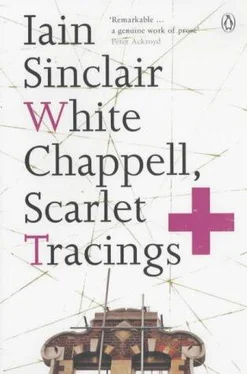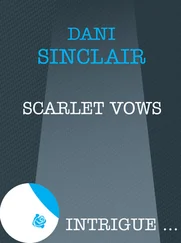‘Hit back! Situation. Forced. They. Them. Those. Got to watch out. No room. Manoeuvre. Context. Precipitate action. BURN!’
Pearl is doing her breathing. Askead puts his son down among the bottles and looks for one with something in it. He’s unlucky. The room is, in fact, obsessively clean. And could, under other circumstances, be accused of complacent and trivialising petty bourgeois tendencies. Flowered cushions. And a hint of south-coast cargo culting. The coffee mugs are polished. And they have names on them!
Nothing can be done until the contact arrives. We remain under suspicion. Denis works out with a squash-ball in his fist, as if squeezing the nuts of the Rt Hon (Leonard) Robert Carr.
‘Nowhere to turn. Can’t let them impose. Conspiracy state. Planted! Trapped. Watched. No room. Landlord. FIRE BOMB!’
The shutter stops-down to a benevolent twilight, but the windows cannot be opened. The phone cannot be touched. They are listening, they hear what we whisper. So we wait. Denis counting as he gives Pearl’s thigh a chinese burn and she breathes at the second level.
We hear the taxi pull up, the slow heart of its motor. Denis tries to fit a kitchen-knife into the pocket of his jeans. There is some dispute over the fare, points of order to be made. In a guttural Bronx accent. Mixed expletives.
The Invisible Insurrection is postponed. It is the contact.
Skulking into the room with dark glasses and a brief-case, long coat, an abortionist’s runner. No names are given, that’s understood. Breathing like he’s got a slow puncture: the contact is unabashed.
‘Hi; I’m Mossy Noonmann. Anyone wanta score?’
In this endless night only the locations change. A low-ceilinged basement now in Petherton Road. It’s hot, uncomfortable, hands around knees, bundles of laundry.
The dialectic falters. The wrongs can be catalogued interminably, but the action remains opaque.
The meeting had been going since the middle of the afternoon. Dryfeld, in an earlier incarnation, under another name, you can try to identify him in Richard Neville’s Playpower , was present; but he’d quit, early, deciding to form a one-man splinter group, a new form of Anarchy, by inventing a scam that would rip-off enough loot from the Post Office to get him to America.
Noonmann sidles along the fringes with his salesman’s briefcase. His credentials are excellent: he’s been thrown out of America and half of Europe, he’s borrowed money, he’s lied, stolen, cheated and escaped with no moral convictions. The only law is survival. And he’s not wholly convinced that he’ll obey that. The afterlife of Lazarus, half decayed. I’ll stand in the shit if you let me stand on your shoulders. Worthy of Dante.
It is a Dutchman who kicks aside the torpid rhetoric of the merely disappointed. He spins off a dozen ploys in as many minutes.
‘You want somewhere to sleep? Go sleep on the steps of the Town Hall. OK? You camp in London Fields. What’s the problem? Do it. Just do it. Let them worry. Use the guilt. The only law is what works.’
As I have the use of a car, I’m the one to drive him. It’s my part of town, but he directs me. The man is solid, older than the others. He’s bearded, is he? The face won’t stick. You can’t describe it; it’s gone. A beret? Sometimes. Or was it a grey trilby?
I don’t know how we got there, I’m listening to him talk.
‘They won’t do anything. I give them a few pokes but nothing comes of it. OK? It’s already finished, I think.
‘In ten years half of these will be begging for jobs in the local government and the other half will be junkies. Or both. OK?’
We park and he leads us down a narrow alleyway. I look at the name in the brick, Angel Alley. It’s Whitechapel. It is alongside the Whitechapel Gallery but I’ve never really noticed it before, one of those slender secrets.
In a room on the left, off the courtyard, there are people standing around a table. They are being given cups of soup and rounds of bread. An oil lamp. Long-headed shadows. They sign a book, pay nothing. Are fed. No questions, no psalms.
On the other side of the court there is a glow from the top-floor windows.
‘Come,’ said the Dutchman, ‘see it.’
Up the stone steps, a long warehouse floor. Dozens of sleeping figures, shapes in bags. So many? Candles at the windows.
‘It’s easy,’ said the Dutchman, ‘it’s nothing. When you can — you do it. When you can’t — move on. OK?’
This is the room. The windows now are filthy, smeared, webbed over. The city is industrial again. Thudding of elephant generators: prophetic smoke. The Masque of Anarchy is cancelled. The dust on the floor is undisturbed. The season has shifted to chill. Joblard is to stage a performance, a Chemical Theatre, an Act of Initiation.
We walk through the locked Gallery; the raven is on the north wall, the owl, the skull of a sheep. The shields, maps, drawings, the burnt wood. We are alone in the building. And a voice. ‘Don’t break the ring!’ Disembodied, behind us, uninflected. Bare walls, polished floors. Once only.
As the scalp pricks, the phone at the front-desk cuts through with its immediate and insistent hysteria. A friend, urgently, for Joblard. He must get hold of today’s SUN.
There’s a vendor at the underground entrance. Centre spread: Friday, March 8, 1974. ‘HORROR’ FIND IN DEATH CASE.
A man accused of murdering his wayward wife had a book which made ‘appalling’ references to Moors murderers Ian Brady and Myra Hindley, a jury heard yesterday .
The book, by ‘performance-artist’ S. L. Joblard, called Necropathia, dealt with dead things, said Mr Gilbert Gray, QC, prosecuting at Leeds Crown Court. ‘There were pictures of bodies, naked and bound, and references in the most appalling print,’ he said.
The book was found by police at the home of Gilbert Friend, who denies murdering his attractive wife, Pat.
Mr Gray claimed that Friend, a labourer, strangled his wife with a blouse and electric flex after discovering she had made love with a neighbour in his Dormobile.
It is alleged that Friend hid the body in a cupboard at her mother’s home and later telephoned his own mother asking her to tell the police where to find the body. He also wrote an alleged confession to his mother. It read: ‘She wanted sex so she took it. I want her and now I have got her. No one else can have her now .
‘She asked for a last kiss, but I couldn’t .
‘She raised her face to me and we kissed. I put my hands on her throat. As she died I said, “I love you.” I am sorry, mother. I love you. I am going now to wait for the end, maybe I will meet her there.’
The trial continues today .
Evening. The room above the courtyard.
Not the thing itself but its receptacle. The shadow preceding its source. Dark sentences. The true performance occurs when the audience has left. Wax moulded around electric lightbulbs drips slowly onto the open books, erasing and patterning the text.
From the rooftops the shadows move into cimmerian windows. Now the red is gone: the tincture of mercury. It is the escape of dead light. An act of blindness, hooded figures between lines of repressed fire. The supplicant has heard the question, but no answer is expected. He passes, without lifting his eyes, along the walls; his stick drags in the dust. Gradually, his acts cancel the text. The performance absorbs all of its own potential, folds back in on itself. Nothing is written, everything repeats. Whispering the future down gummed tubes of hide. The voice is the throat.
Joblard’s hesitation shudders breath. The ghost escapes. A singe of wax. Memory leaking, unconnected to any past. The empty room. Candle-flames leaving black ferns on the glass. The performance is what happens afterwards. The cup of soft wax takes the print of an unknown key.
Читать дальше












